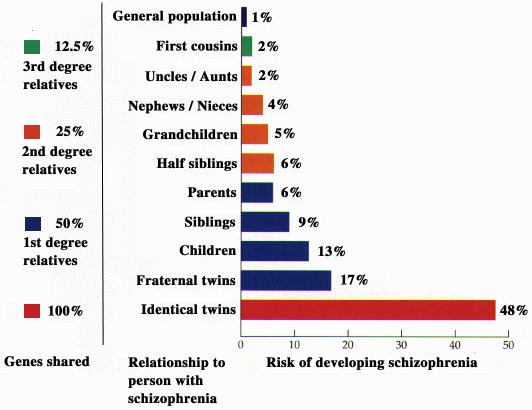Scientists have already discovered at least a few genes that may be linked to the onset of schizophrenia. Some reports say that mutations lead to a change in the amount of neurotransmitters in the brain, while others argue that genetic disorders can impair brain plasticity. The link between genes and schizophrenia can also be supported by the fact that if someone in a given person’s family has schizophrenia, he or she is at an increased risk of developing the disease.

Since schizophrenia can endanger the lives of patients, as well as — not uncommonly — the difficulties that arise in the treatment of schizophrenia, scientists are still analyzing the underlying factors. There is probably no single specific cause of schizophrenia — the etiology of this division takes into account, among other things, infections suffered by patients during their intrauterine life, as well as the use of psychoactive substances by patients in the early stages of life. Genetic disorders are another potential cause of schizophrenia.
What genes are associated with schizophrenia?
The prevalence of schizophrenia among the population is estimated at about 1% and is approximately the same in different regions of the world. Thus, the presence of such a relationship may indicate that environmental factors (associated with the place of residence of patients) actually play a minor role in the pathogenesis of schizophrenia. Therefore, the attention of researchers is directed to other potential causes of this disease, including in relation to genes and related disorders.

The efforts invested in research so far have not been in vain — it has been possible to find certain genes whose mutations can contribute to the development of schizophrenia. One such gene is the COMT gene, which encodes the catechol-o-methyltransferase enzyme. This protein is responsible for the metabolism of neurotransmitters, including dopamine. It has been observed that mutations in the COMT gene can lead to a change in the amount of dopamine in the brain — and it is precisely the disturbances in the amount of this neurotransmitter that are found in patients with schizophrenia.
Another gene that appears to be associated with schizophrenia is DISC1. This gene even has a name derived from the disease in which the pathogenesis may be involved — the abbreviation DISC1 comes from the English phrase «disrupted in schizophrenia», which can be translated as «damaged in schizophrenia.» In studies done on mice, mutations in this gene have been noted to alter what is known as brain plasticity. This feature is especially important because it allows the mind to adapt to changing environmental conditions — thanks to the plasticity of the brain, to form new neural connections. It is believed that impaired brain plasticity, which can be caused by a mutation in the DISC1 gene, may increase the risk of developing schizophrenia.










